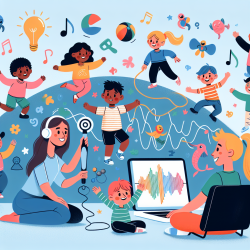As a speech-language pathologist dedicated to creating optimal outcomes for children, understanding how sensory experiences affect adolescents with Autism Spectrum Condition (ASC) in the classroom is crucial. Recent research titled How Sensory Experiences Affect Adolescents with an Autistic Spectrum Condition within the Classroom provides invaluable insights that can help practitioners tailor their approaches to better support these students.
Key Findings from the Research
The study utilized the Adolescent/Adult Sensory Profile (AASP) and a qualitative questionnaire to assess sensory issues in school children with ASC. The results indicated that:
- All participants experienced sensory difficulties outside normal parameters.
- Hearing was the most affected sensory domain, followed by touch, smell, and vision.
- Sensory experiences were largely negative, impacting learning and concentration.
Practical Applications for Practitioners
To improve outcomes for adolescents with ASC in the classroom, consider the following evidence-based strategies:
Create Individual Sensory Profiles
Given the variability in sensory experiences, developing individualized sensory profiles for each student with ASC can provide a tailored approach to managing sensory sensitivities. This personalized profile can guide interventions and classroom modifications.
Minimize Auditory Distractions
Since hearing was identified as the most affected domain, implementing strategies to reduce auditory distractions can be beneficial. This could include:
- Using noise-canceling headphones.
- Creating quiet zones in the classroom.
- Using visual cues instead of auditory instructions when possible.
Address Touch Sensitivities
For students affected by touch sensitivities, consider adjustments such as:
- Allowing the use of fidget tools.
- Providing seating options that minimize tactile discomfort.
- Incorporating sensory breaks that include deep pressure activities.
Implement Sensory-Friendly Classroom Designs
Designing a classroom environment that is sensory-friendly can significantly reduce stress and improve focus for students with ASC. This includes:
- Using natural lighting to reduce glare and visual discomfort.
- Incorporating calming colors and reducing visual clutter.
- Ensuring good ventilation to minimize bothersome smells.
Encouraging Further Research
While this study provides essential insights, ongoing research is needed to deepen our understanding of sensory processing issues in adolescents with ASC. Practitioners are encouraged to contribute to this body of knowledge by documenting their observations and sharing successful intervention strategies.
To read the original research paper, please follow this link: How Sensory Experiences Affect Adolescents with an Autistic Spectrum Condition within the Classroom.










